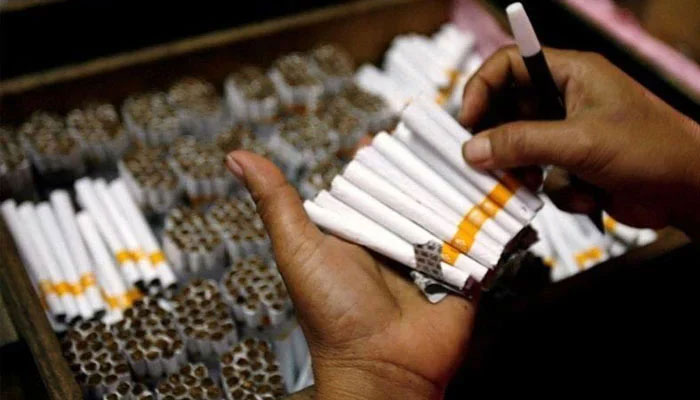In smoke and shadows
Over 50% of Pakistan’s cigarette market is controlled by illegal manufacturers who evade taxes
Pakistan is grappling with a critical issue – a rampant illicit cigarette trade, dominated by non-taxpaying local manufacturers. This underground market not only drains vital tax revenue but also undermines the formal tobacco industry, distorts economic growth, and weakens public health initiatives.
Despite its widespread impact, the government has largely remained silent, raising concerns about the influence of powerful lobbies and political agendas.
Over 50 per cent of Pakistan’s cigarette market is controlled by illegal manufacturers who evade taxes. These untaxed cigarettes flood the market, often at a fraction of the cost of legal products, depriving the government of crucial revenue. This lost revenue could fund social programmes, improve infrastructure, and support public health initiatives aimed at reducing tobacco use.
The continued growth of this illegal sector raises a troubling question: Is the government more concerned with protecting powerful vested interests than with safeguarding public health and economic stability?
Complicating matters are NGOs that advocate for tobacco control but have been linked to allegations of embezzlement, financial mismanagement, and potential diversion of funds for terror financing. Over the past years, there have been numerous terminations within these organisations due to embezzlement and financial mismanagement.
In a country like Pakistan, where health funding is already scarce, these misappropriations further hinder efforts to combat smoking. Adding to the problem, some INGOs downplay the issue of illicit trade in the tobacco sector, unintentionally providing cover for illegal manufacturers. In their pursuit of funding, these organisations often compromise their ethical standards, which not only undermines tobacco control efforts but also exacerbates broader public health and economic challenges.
Despite claims of prioritising economic growth, the ongoing illicit cigarette trade suggests that entrenched lobbies continue to undermine regulatory enforcement, particularly in the tobacco sector. This highlights a deeper issue – powerful interests within the illicit trade influence policy, preventing the government from taking decisive action.
The unchecked growth of the illicit cigarette market not only results in lost tax revenue but also threatens Pakistan’s broader business environment. Legitimate businesses are forced to compete with illegal products that evade taxes and are often produced under substandard conditions. This creates an uneven playing field, discouraging investment and sending a negative signal to foreign investors. If left unchecked, the illicit trade risks damaging investor confidence, stunting economic growth, and pushing away much-needed foreign capital.
Pakistan must confront the realities of its illicit cigarette trade by enforcing stricter laws and regulations. This issue is not just about protecting businesses or generating revenue – it is about ensuring a level playing field, securing economic stability, and protecting public health. Addressing this silent crisis can help reclaim lost tax revenue, support legitimate industries, and reduce the harm caused by tobacco consumption.
The question remains: Will the Pakistani government stand up to powerful lobbies and take action, or will it continue to allow the illicit trade to undermine the country’s economy, public health and rule of law? The time for action is now.
The writer is the CEO of an advocacy firm dedicated to curbing illicit trade and tax evasion in Pakistan.
-
 Kanye West's Last Measure To Save Bianca Censori Marriage As He Tries To Salvage Image
Kanye West's Last Measure To Save Bianca Censori Marriage As He Tries To Salvage Image -
 Kim Kardashian Finally Takes 'clear Stand' On Meghan Markle, Prince Harry
Kim Kardashian Finally Takes 'clear Stand' On Meghan Markle, Prince Harry -
 Christina Applegate Makes Rare Confession About What Inspires Her To Keep Going In Life
Christina Applegate Makes Rare Confession About What Inspires Her To Keep Going In Life -
 Patrick J. Adams Shares The Moment That Changed His Life
Patrick J. Adams Shares The Moment That Changed His Life -
 Selena Gomez Getting Divorce From Benny Blanco Over His Unhygienic Antics?
Selena Gomez Getting Divorce From Benny Blanco Over His Unhygienic Antics? -
 Meet Arvid Lindblad: Here’s Everything To Know About Youngest F1 Driver And New Face Of British Racing
Meet Arvid Lindblad: Here’s Everything To Know About Youngest F1 Driver And New Face Of British Racing -
 At Least 30 Dead After Heavy Rains Hit Southeastern Brazil, 39 Missing
At Least 30 Dead After Heavy Rains Hit Southeastern Brazil, 39 Missing -
 Courtney Love Recalls How ‘comparison’ Left Marianne Faithfull ‘broken’
Courtney Love Recalls How ‘comparison’ Left Marianne Faithfull ‘broken’ -
 Pedro Pascal Confirms Dating Rumors With Luke Evans' Former Boyfriend Rafael Olarra?
Pedro Pascal Confirms Dating Rumors With Luke Evans' Former Boyfriend Rafael Olarra? -
 Ghost's Tobias Forge Makes Big Announcement After Concluding 'Skeletour World' Tour
Ghost's Tobias Forge Makes Big Announcement After Concluding 'Skeletour World' Tour -
 Katherine Short Became Vocal ‘mental Illness’ Advocate Years Before Death
Katherine Short Became Vocal ‘mental Illness’ Advocate Years Before Death -
 SK Hynix Unveils $15 Billion Semiconductor Facility Investment Plan In South Korea
SK Hynix Unveils $15 Billion Semiconductor Facility Investment Plan In South Korea -
 Buckingham Palace Shares Major Update After Meghan Markle, Harry Arrived In Jordan
Buckingham Palace Shares Major Update After Meghan Markle, Harry Arrived In Jordan -
 Demi Lovato Claims Fans Make Mental Health Struggle Easier
Demi Lovato Claims Fans Make Mental Health Struggle Easier -
 King Hospitalized In Spain, Royal Family Confirms
King Hospitalized In Spain, Royal Family Confirms -
 Japan Launches AI Robot Monk To Offer Spiritual Guidance
Japan Launches AI Robot Monk To Offer Spiritual Guidance




